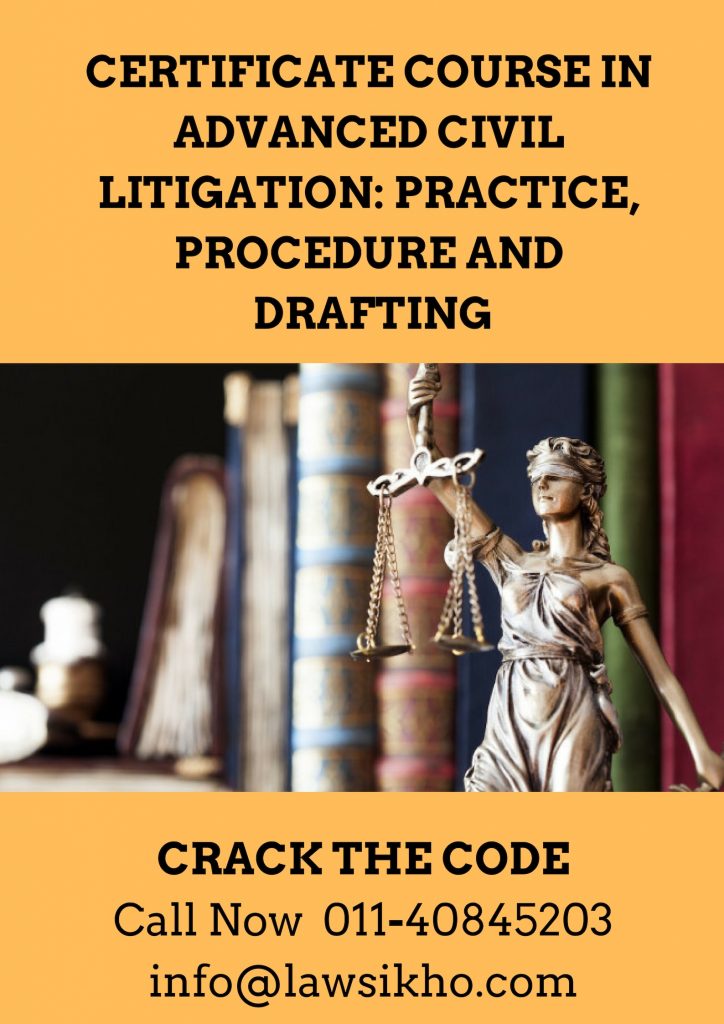This article is written by Heba Ali, a 2nd Year BBA LLB student at Symbiosis Law School, Noida. In this Article, she discusses the elements that constitute the Tort of Malicious Arrest.
What is Malicious Prosecution?
Malicious Prosecution is generally a prosecution against a person without any probable cause that causes damage. Malicious Prosecution is a kind of tort and the person or the victim has all the powers to even sue the police authorities for the damage they have done. For example, A tells B a police officer to arrest D and B (police officer) thinks C is D and arrest and A tells B to arrest him even though he knows that C is not D. Then here A could be held liable for malicious prosecution by the court of law. Liability which arises in malicious prosecution has always had to go between the two principles- one is the freedom to take actions which means freedom to set law in motion and to bring criminals into justice and two is the necessity to check false accusation against innocent people.
Essential Elements of a malicious prosecution
The essential elements of malicious prosecution are-
- The defendant started the prosecution.
- Without any reasonable and probable cause.
- The defendant acted with malicious intent.
- Prosecution terminated in favour of the plaintiff.
- Plaintiff suffered damage or any kind of injury as a result of prosecution.
Defendant started the prosecution
The first thing that the plaintiff is needed to prove is that the prosecution which was started was done by the defendant himself to file a suit for damages against the defendant. The word “prosecution” carries a wider sense than a trial and includes criminal proceedings by way of appeal, or revision.[1] In one of the case the court held that merely bringing the matter before the executive authority does not amount to prosecution and, therefore, the action for malicious prosecution could not be maintained just by showing that the case was brought to the note of police officials.[2]
It is important to note that an inquiry by the police officials cannot be termed as prosecution as held in the case of D.N. Bandopadhyaya v. Union of India[3]. By this statement, the court made it clear that there should be more than just filing of the prosecution to the police officials. In one more case of Musa Yakum vs Manilal the court stated that it will be no excuse for the defendant that he instituted the prosecution under the order given by the court if the court was moved by the false evidence which was submitted by the defendant and gave the order.
Prosecution without any Reasonable And Probable Cause
If one is filing a suit for malicious prosecution also has the requirement to prove that the defendant who has filed the case has done it without any reasonable and probable cause. The question is whether it has any reasonable and probable cause will depend on the facts of the case [4]and will be decided by the court on the basis of facts.[5] In the case of Antarajami Sharma vs Padma Bewa, it has been said that law is settled that in a case of damages for malicious prosecution, the onus of proof of the absence of reasonable and probable clause rests on the plaintiff.[6]
The dismissal of any prosecution, in any case, does not mean the absence of reasonable and probable cause. If a man prefers an indictment which contains several other charges and for some, there is a reasonable cause and for others, there is no then in that case, the liability of malicious prosecution would be complete.
Defendant Acted With Malicious Intent
Essential elements in a suit for damages for malicious prosecution is that the plaintiff is required to prove that the defendant acted with malicious intent in prosecuting the plaintiff and not with the mere intention of carrying the law into motion. Malice is not just a feeling of ill will or spirit of vengeance towards the plaintiff but it may be to act with any improper purpose which motivates the prosecutor to gain an advantage over the person.
Malice may be inferred upon proof of the absence of honest belief in the accusation and consequent want of reasonable and probable cause for instituting the prosecution complained of.[7] It is not important the prosecutor was acting maliciously from the beginning itself but becomes malicious at a later stage then an action for malicious prosecution could be maintained. In the case of Bank of India vs Lakshmi Das the court defined malice and stated that malice in absence of a probable and reasonable cause must be proved by the defendant himself before the court of law.[8]

In State of Punjab vs Des Raj[9], the plaintiff was doing business in food grains and was having a very good reputation. Then a food inspector was having ill-will against the plaintiff as he did not supply him one bag of rice free of cost. And due to that grudge, he falsely implicated the plaintiff. The prosecution was launched against the plaintiff on the basis of a False report made by the food inspector. The court subsequently acquitted the plaintiff on the grounds that the allegation was found to be false. After the acquittal the plaintiff filed a suit for recovery of damages for his malicious prosecution. The court held that the plaintiff was entitled to damages as the prosecution launched against the plaintiff was based without proper investigation and was totally malicious.
Prosecution terminated in favour of the plaintiff
In a suit for claiming damages for malicious prosecution, plaintiff has to show that the proceedings initiated against him ended in favour of the plaintiff but it does not mean the absence of innocence rather it means the absence of guilt by the judicial mechanism.
An action cannot be initiated while the proceedings are still pending in the court of law. Then the withdrawal of prosecution due to settlement, bars accused’s claim for damages for malicious prosecution, provided the settlement was between him and the prosecutor. But, where if the withdrawal was the result of a settlement between the prosecution and one of several accused, the other accused are not disentitled to make the claim.
Types of Malicious Prosecution
Malicious prosecution In a Civil Proceeding
It has been held by the court that malicious institution of a civil suit is not actionable. As we have seen above if A launches a false criminal case against B maliciously and without reasonable and probable cause and B is acquitted. He can bring civil suit against A for damage due to the criminal case. But if A files a false and frivolous civil suit against B and B wins the case, he cannot file another civil suit for damages and costs.
The reason behind this is that in civil suit damage of reputation is absent because the action is tried in public and if the person wins his case his fair name will be cleared up. The second head of damage that is damage to a person is not in question. In a civil suit, there is no likelihood of a person’s going to jail or suffering any other sentence. As regards the third kind of damage that is the court orders cost to be awarded to a successful party if he is entitled to it and so no other proceeding is needed for expenses to the litigation. The reason why an action does not lie for falsely and maliciously prosecuting an ordinary civil action is that such a case does not necessarily and naturally involve damage to the party sued. The court does not award damages for mental anxiety or for extra costs incurred beyond those imposed on the unsuccessful party.
Malicious prosecution In a Criminal Proceeding
A criminal charge involving scandal for reputation or the possible loss of life and liberty to the party charged does necessarily and naturally involve damage and in such a case damage to reputation will be presumed.[10] Thus we see that in a civil suit there being no damage to defendant’s fame, person or property he cannot bring another suit for damage. Another reason for this is if an action for malicious prosecution were allowed in respect of a civil suit there will be a circle of actions and the litigation will never close. Suppose A sues B in a civil court then the suit is decided in favour of B. Then B will file a civil suit for the malicious institution of the suit. If the suit fails, again A will file a suit against, so the chain would never come to an end and this is the reason why civil suit for damages are not allowed.
Damages suffered in case of a malicious prosecution
The person who has suffered and has been maliciously prosecuted can successfully bring an action against his prosecutor but only when he suffers some damage from the prosecution. If he/she suffers no damage he cannot sue. The damage may be one of the three kinds and they are as follows-
- Damage to his person as when a person is prosecuted with a crime by the punishment of which he may lose his life, limb or liberty.
- Damage to a person’s fame, for example, to prosecute for a crime which involves some slur on his character.
- Damage to his property as when he is forced to spend money on necessary charges to acquit himself of the crime which he is accused for example fees of a lawyer, loss of business during the trial or proceedings.
It must be borne in mind of the person that the damage is done, and need not necessarily be proved by someone. It may be presumed in such situations. Then in cases of prosecution which involves some scandal about the character of a person, damage to his reputation is proved and need not be proved.
If in a case it happens where one is prosecuted for an offence which is only technical breach of some bye-law involving no reflection on moral character then there it was held that there was no loss of reputation. For example, in the case of Wiffen vs Baily[11] it was held by the court that there was no loss of reputation in respect of a complaint under the Public Health Act for non-compliance with notice to remove a nuisance on one’s own premises. Again, if the offence for which the plaintiff was charged was only punishable with fine, and the damage to the person cannot be claimed. So, in case of malicious prosecution, only punitive damages are given and these damages are to given to penalize the plaintiff for bringing the case to the court.
References
[1] Sheikh Mehtab v. Balaji, ILR 1946 Nag 358.
[2] Khagendra Nath v. Jacob Chandrathe 1976 Assam L.R. 379
[3] AIR 1976 Raj. 83
[5] Niaz Mohammad Khan v. Deane, (1948) ILR 2 Cal 310.
[6] AIR 2007 Ori. 107
[7] Bhim Sen v. Sita Ram, (1902) ILR 24 All 363
[8] (2000) 3 SCC 640
[9] AIR 2004 Punjab and Haryana 113.
[10] Mohamad Amin vs Jogendra Kumar Banerji, AIR 1947 PC 108
[11] (1915) I KB 600
Reading time- 10 minutes
 Serato DJ Crack 2025Serato DJ PRO Crack
Serato DJ Crack 2025Serato DJ PRO Crack









 Allow notifications
Allow notifications


